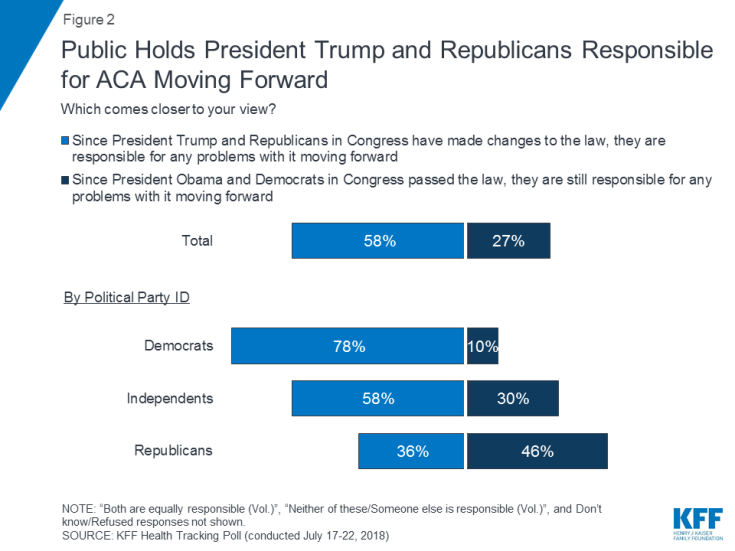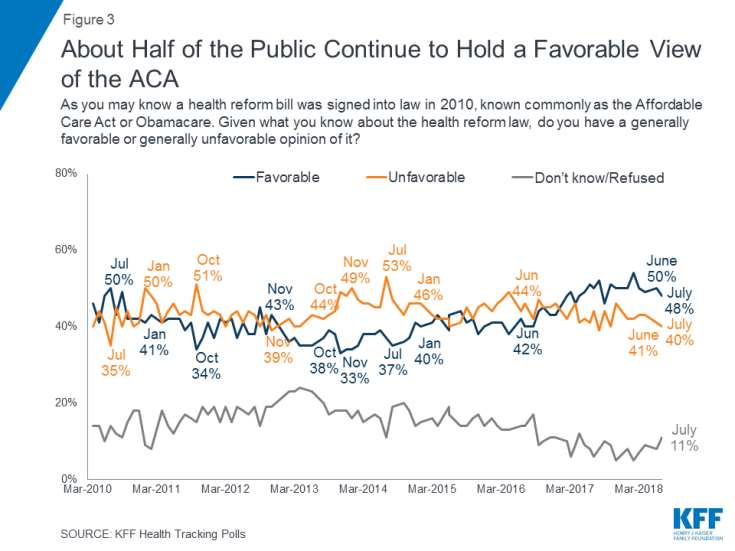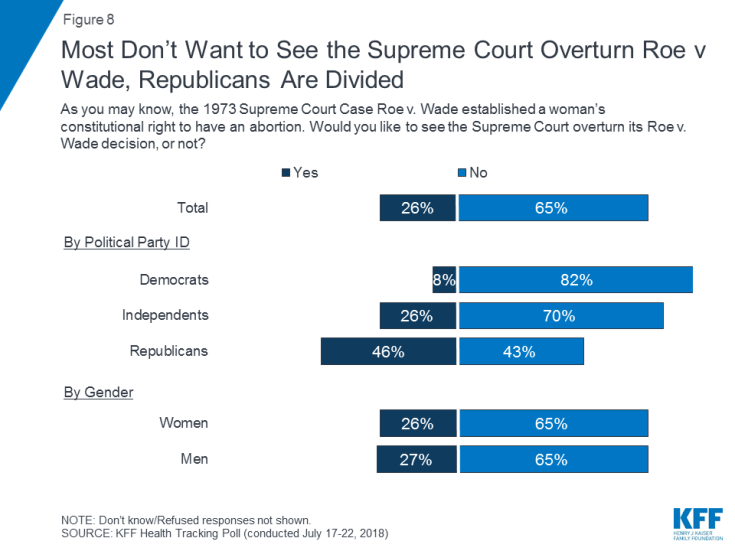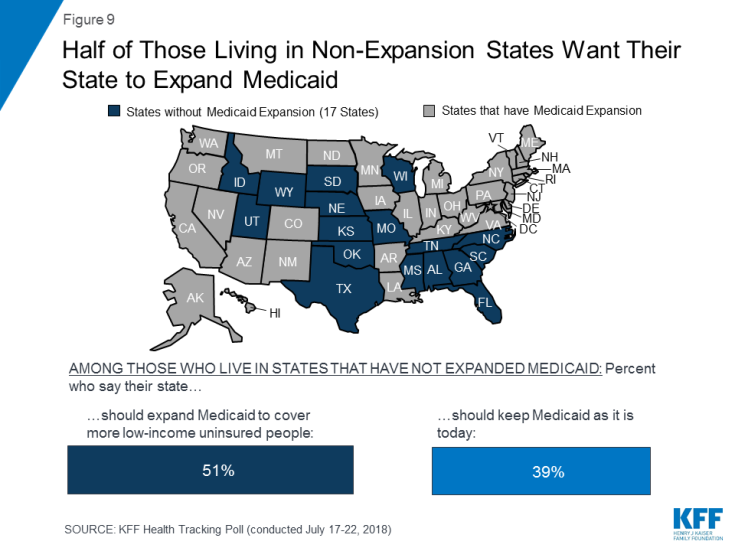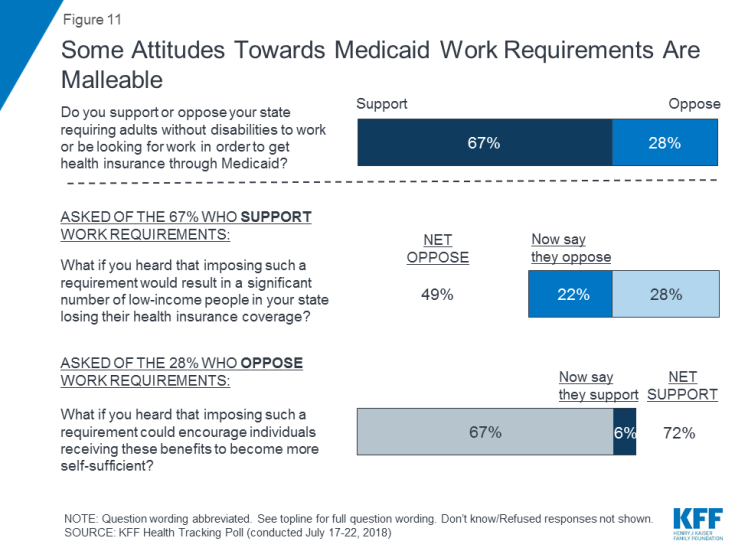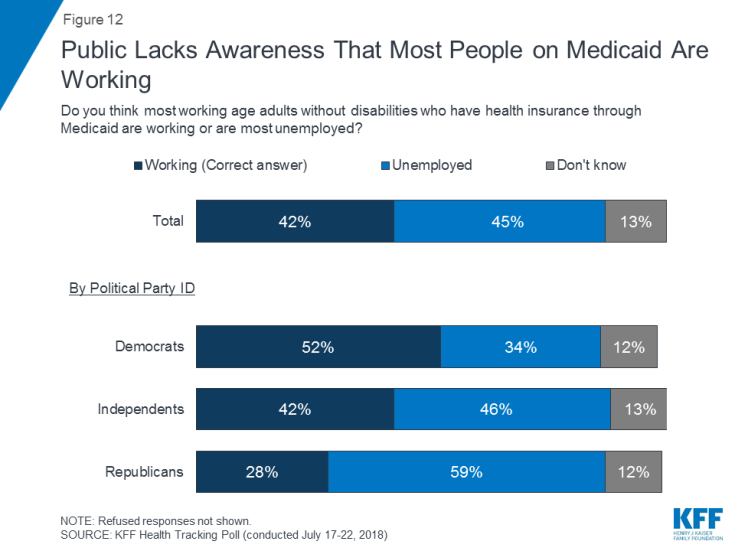Kaiser Health Tracking Poll - July 2018: Changes to the Affordable Care Act; Health Care in the 2018 Midterms and the Supreme Court
Key Findings:
- The July Kaiser Health Tracking Poll finds a candidate’s position on continuing protections for people with pre-existing health conditions is the top health care campaign issue for voters, among a list of issues provided. This issue cuts across voter demographics with most Democratic voters (74 percent), independent voters (64 percent), and voters living in battleground areas (61 percent), as well as half of Republican voters (49 percent) saying a candidate’s position on continued protections for pre-existing health conditions is either the single most important factor or a very important factor in their 2018 vote.
- When it comes to the Supreme Court and possible future court cases, once again, continued protections for people with pre-existing conditions weighs heavy on the minds of the public. Nearly two-thirds (64 percent) do not want to see the Supreme Court overturn these protections compared to half (52 percent) who do not want to see the Supreme Court overturn the Affordable Care Act (ACA) more generally.
- Almost six in ten (56 percent) Americans say they think President Trump and his administration are trying to make the ACA fail while one-third (32 percent) say they are trying to make the law work. Most of those who say they think the Trump administration is trying to make the law fail think this is a “bad thing” (47 percent of the public). In addition, most (58 percent) say since President Trump and Republicans in Congress have made changes to the ACA, they are responsible for any problems with it moving forward.
- As of July 20, 2018, 14 states have not expanded their Medicaid programs and three states are considering expansion. Among those living in states that have not yet expanded Medicaid, half (51 percent) support their state expanding their Medicaid program. A majority say they would be more likely to support Medicaid expansion if there is a work requirement included in the expansion. For example, among those who don’t initially support expansion (39 percent of people living in non-expansion states), most (68 percent) say they say they would be “more likely” to support expansion if their state included a work requirement.
President Trump and the Affordable Care Act
President Trump’s administration has taken several recent actions related to the ACA marketplaces including reducing funding for advertising and introducing association health insurance plans that cover fewer benefits than traditional ACA plans. The July Kaiser Health Tracking Poll finds almost six in ten (56 percent) say they think President Trump and his administration are trying to make the health care law fail while one-third (32 percent) say they are trying to make the law work. Most of those who say they think the Trump administration is trying to make the law fail think this is a “bad thing” (47 percent of the public), while few (7 percent of the public) say it is a “good thing.”
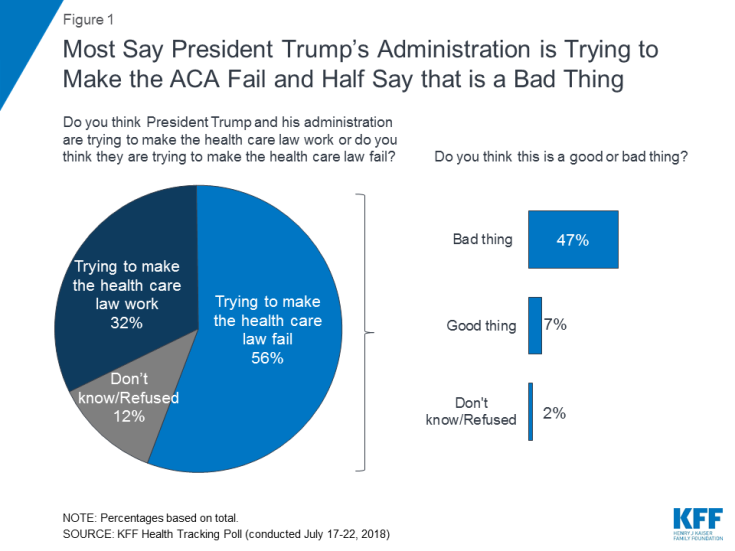
Figure 1: Most Say President Trump’s Administration is Trying to Make the ACA Fail and Half Say that is a Bad Thing
Most Democrats (77 percent) and nearly half of independents (45 percent) say they think the Trump administration is trying to make the ACA fail and this is a bad thing. Republicans, on the other hand, think the recent actions are an effort by the Trump administration to make the law work and this is a good thing (56 percent).
| Table 1: Is the Trump Administration Trying to Make the ACA Work or Fail? | ||||
| Percent who say… | Total | Democrats | Independents | Republicans |
| …the Trump administration is trying to make the law work: | 32% | 11% | 34% | 60% |
| This is a good thing | 28 | 9 | 28 | 56 |
| This is a bad thing | 3 | 1 | 4 | 4 |
| …the Trump administration is trying to make the law fail: | 56 | 80 | 54 | 28 |
| This is a good thing | 7 | 1 | 8 | 14 |
| This is a bad thing | 47 | 77 | 45 | 10 |
| Note: Don’t know/Refused responses not shown. | ||||
Similar to findings from six months ago, the majority of the public (58 percent) say since President Trump and Republicans in Congress have made changes to the ACA, they are responsible for any problems with it moving forward, compared to one-fourth (27 percent) who say that because President Obama and Democrats in Congress passed the law, they are responsible for any problems with it. Partisan differences continue, with majorities of Democrats (78 percent) and independents (58 percent) saying President Trump and Republicans are responsible for any problems with it moving forward. Republicans are more divided, but a larger share say President Obama and Democrats (46 percent) are responsible than say the same about President Trump and Republicans (36 percent).
The most recent Kaiser Health Tracking Poll continues to find the public more favorable than unfavorable in their views of the ACA, with 48 percent saying they have a favorable view and 40 percent saying they have an unfavorable view. This continues the trend of a larger share of the public holding favorable views rather than unfavorable ones, first measured during the Republican efforts to repeal the ACA during 2017. A majority of Republicans continue to hold unfavorable views of the 2010 law (77 percent) while most Democrats view the law favorably (75 percent). About half of independents (51 percent) say they hold favorable views toward the ACA, while 40 percent hold unfavorable views.
Health Care in the 2018 Campaigns and the U.S. Supreme Court Debate
The July Kaiser Health Tracking Poll examines the role of health care in both the 2018 midterm elections and President Trump’s recent nomination of Judge Kavanaugh to the U.S. Supreme Court.1
Pre-Existing Conditions Top List of Public’s Health Care Priorities in the 2018 Campaigns
A series of recent national polls released continue to find health care among the top issues for voters in the 2018 campaigns. This month’s Kaiser Health Tracking Poll looks at how important a candidate’s positions on specific health care issues are to voters and finds that protections for pre-existing conditions seem to be weighing heaviest on the minds of the public.
Few voters (about one in ten) say a candidate’s support for a variety of different health care positions will be the “single most important factor” in their 2018 vote choice, but more than six in ten (63 percent) say a candidate’s position on continuing protections for people with pre-existing health conditions is either the “single most important factor” or “very important, but not the most important factor.” Continuing protections for people with pre-existing health conditions tops the list and is followed by a closely bunched list of all of the other health issues provided to voters including repealing the ACA (53 percent) and the Supreme Court overturning the 1973 case Roe v. Wade (51 percent).
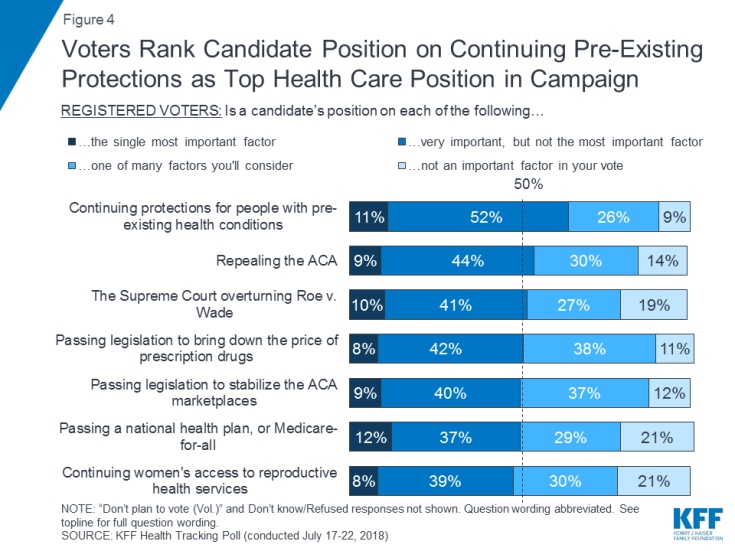
Figure 4: Voters Rank Candidate Position on Continuing Pre-Existing Protections as Top Health Care Position in Campaign
A candidate’s position on continuing protections for people with pre-existing health conditions is the top health care campaign issue among the ones tested in the poll, regardless of party identification. Most Democratic voters (74 percent), independent voters (64 percent) and half of Republican voters (49 percent) say a candidate’s position on continued protections for pre-existing health conditions is either the “single most important factor” or a “very important, but not the most important factor,” in their 2018 vote. A candidate’s position on continuing protections for people with pre-existing conditions is also the top campaign issue for voters living in battleground areas (61 percent).
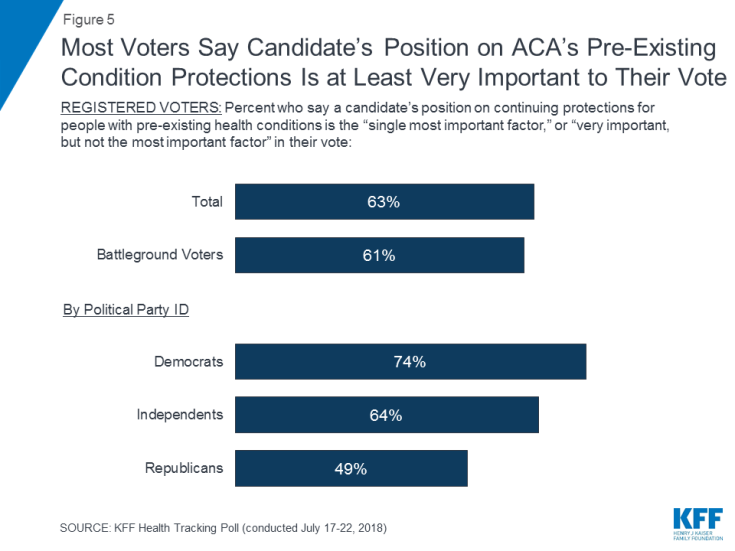
Figure 5: Most Voters Say Candidate’s Position on ACA’s Pre-Existing Condition Protections Is at Least Very Important to Their Vote
2018 Midterm Election Analysis
As part of Kaiser Family Foundation’s effort to examine the role of health care in the 2018 midterm elections, throughout the year we will be tracking the views of voters – paying special attention to those living in states or congressional districts in which both parties have a viable path to win the election. This group, referred to in our analysis as “voters in battlegrounds” is defined by the 2018 Senate, House, and Governor ratings provided by The Cook Political Report. Congressional and Governor races categorized as “toss-up” were included in this group. A complete list of the states and congressional districts included in the comparison group is available in Appendix A.
Health Care and the U.S. Supreme Court
President Trump’s administration announced earlier this month that it will no longer defend the ACA’s protections for people with pre-existing medical conditions. These provisions prohibit insurance companies from denying coverage based on a person’s medical history (known as guaranteed issue), and prohibit insurance companies from charging those with pre-existing conditions more for coverage (known as community rating). The Trump administration argues that both of these protections are unconstitutional and should be deemed invalid once the individual mandate penalty goes away starting January 1, 2019. Some scholars believe that this case is headed to the U.S. Supreme Court where the court will rule on the constitutionality of both the 2010 law overall and the provisions protecting individuals with pre-existing conditions.
Overall, nearly two-thirds (64 percent) of the public do not want to see the Supreme Court overturn the protections for people with pre-existing health conditions and half (52 percent) do not want to see the Supreme Court overturn the 2010 health care law (ACA) more generally.
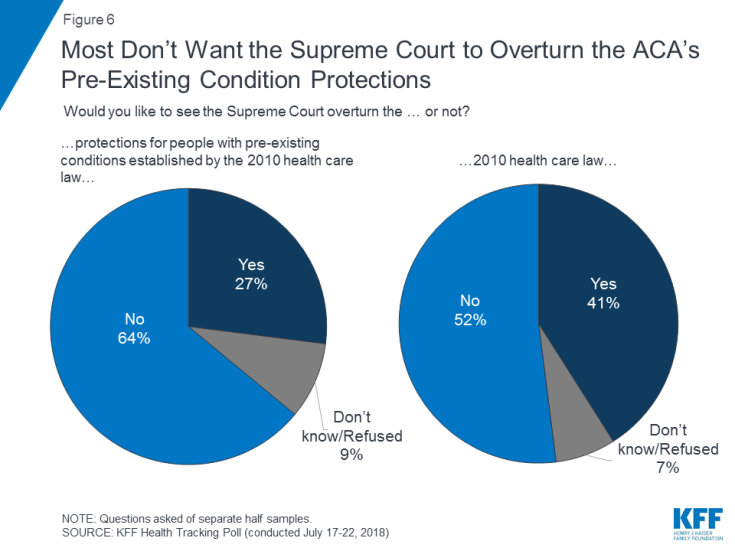
Figure 6: Most Don’t Want the Supreme Court to Overturn the ACA’s Pre-Existing Condition Protections
Majorities of Democrats (70 percent), independents (71 percent), and half of Republicans (49 percent) say they do not want the Supreme Court to overturn the protections for people with pre-existing conditions. This is consistent with previous KFF polling, including last month’s tracking poll that found broad public support for these protections.
When the question is framed more generally about the ACA, most Republicans (71 percent) say they want to see the court overturn the 2010 law while majorities of Democrats (73 percent) and independents (58 percent) say they do not want to see the ACA overturned by the Supreme Court.
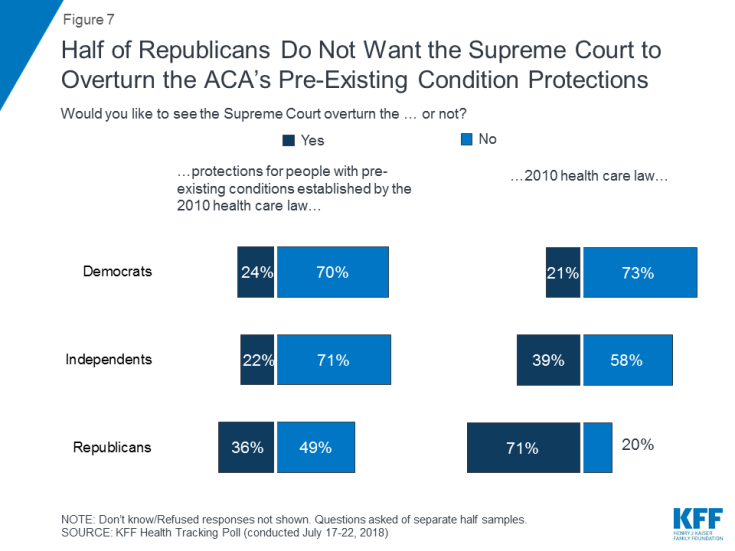
Figure 7: Half of Republicans Do Not Want the Supreme Court to Overturn the ACA’s Pre-Existing Condition Protections
the U.S. Supreme Court and Roe v. Wade
Another possible health issue in front of the U.S. Supreme Court in the coming years is the 1973 Supreme Court case Roe v. Wade which established a woman’s right to an abortion. Two-thirds (65 percent) of the public do not want to see the Supreme Court overturn this case – including majorities of both men and women – while one-fourth (26 percent) say they would like to see the Supreme Court overturn this case. There are partisan differences with majorities of Democrats (82 percent) and independents (70 percent) saying they do not want to see the case overturned, while Republicans are more divided (46 percent v. 43 percent).
Medicaid Expansion and Work Requirements
As of July 20, 2018, 14 states have not expanded their Medicaid programs while three states are considering expansion.2 Among individuals living in states that have not expanded their Medicaid program, half (51 percent) say they would like their state to expand Medicaid to cover more low-income uninsured people while four in ten (39 percent) say they would like to see their state keep Medicaid as it is today.
In January 2018, the Centers for Medicare and Medicaid Services (CMS) provided new guidance for Section 1115 waivers, which would allow states to impose work requirements for individuals covered by Medicaid benefits.3 Including a work requirement as part of the Medicaid program does make some individuals more likely to support Medicaid expansion in their state. Among those living in states that have not expanded Medicaid who don’t initially support expansion, two-thirds (68 percent) say they would be “more likely” to support expansion if their state included a work requirement for nonelderly adults who the state says are able to work. Few (10 percent) say including a work requirement would make them “less likely” to support expanding Medicaid.
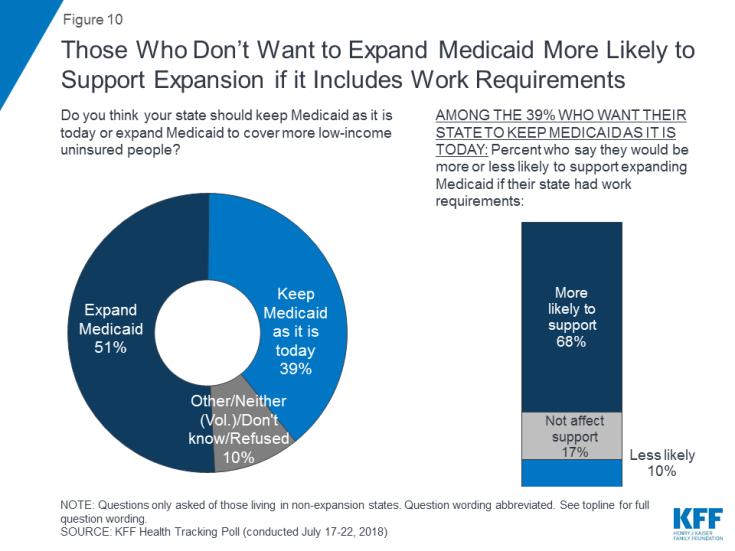
Figure 10: Those Who Don’t Want to Expand Medicaid More Likely to Support Expansion if it Includes Work Requirements
Overall, two-thirds of the public (67 percent) support allowing their state to require adults without disabilities to work or be looking for work in order to get health insurance through Medicaid while three in ten (28 percent) oppose this. This is consistent with previous KFF polling which finds majority support for this proposed change to the Medicaid program. But as with other complex health policy issues, some of the public shifts their attitudes upon hearing counter-messages regarding Medicaid work requirements.
When those who initially support these requirements are told that imposing such requirements would result in a significant number of low-income people in their state losing health insurance coverage, one- third (one-fifth of the public overall) change their mind, bringing the total opposition to about half (49 percent). On the other side of the argument, when those who initially oppose imposing work requirements in their state are told that such a requirement could encourage individuals receiving these benefits to become more self-sufficient, one-fifth (six percent of the public overall) change their minds and now support Medicaid work requirements, pushing total support to 72 percent.
Despite large Shares Reporting Being connected to Medicaid Program, Public Lacks awareness about Medicaid Population
Overall, seven in ten Americans (71 percent) say they have ever had a connection to the Medicaid program either directly through their own health insurance coverage (34 percent) or their child being covered by the program (seven percent), or indirectly through a friend or family member being covered by the program (30 percent).
Despite large shares reporting ever being connected to Medicaid, the public is divided in their understanding of whether most working age adults without disabilities who are covered by Medicaid are working (42 percent) or unemployed (45 percent), with 13 percent saying they “don’t know.” Some studies have recently shown that most non-elderly adults without disabilities on Medicaid are currently working.4

